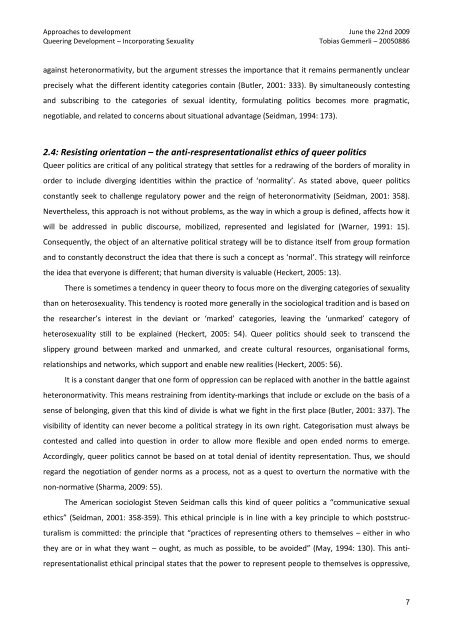Queering Development - Incorporating Sexuality - The problem of ...
Queering Development - Incorporating Sexuality - The problem of ...
Queering Development - Incorporating Sexuality - The problem of ...
Create successful ePaper yourself
Turn your PDF publications into a flip-book with our unique Google optimized e-Paper software.
Approaches to development June the 22nd 2009<strong>Queering</strong> <strong>Development</strong> – <strong>Incorporating</strong> <strong>Sexuality</strong> Tobias Gemmerli – 20050886against heteronormativity, but the argument stresses the importance that it remains permanently unclearprecisely what the different identity categories contain (Butler, 2001: 333). By simultaneously contestingand subscribing to the categories <strong>of</strong> sexual identity, formulating politics becomes more pragmatic,negotiable, and related to concerns about situational advantage (Seidman, 1994: 173).2.4: Resisting orientation – the anti-respresentationalist ethics <strong>of</strong> queer politicsQueer politics are critical <strong>of</strong> any political strategy that settles for a redrawing <strong>of</strong> the borders <strong>of</strong> morality inorder to include diverging identities within the practice <strong>of</strong> ‘normality’. As stated above, queer politicsconstantly seek to challenge regulatory power and the reign <strong>of</strong> heteronormativity (Seidman, 2001: 358).Nevertheless, this approach is not without <strong>problem</strong>s, as the way in which a group is defined, affects how itwill be addressed in public discourse, mobilized, represented and legislated for (Warner, 1991: 15).Consequently, the object <strong>of</strong> an alternative political strategy will be to distance itself from group formationand to constantly deconstruct the idea that there is such a concept as ‘normal’. This strategy will reinforcethe idea that everyone is different; that human diversity is valuable (Heckert, 2005: 13).<strong>The</strong>re is sometimes a tendency in queer theory to focus more on the diverging categories <strong>of</strong> sexualitythan on heterosexuality. This tendency is rooted more generally in the sociological tradition and is based onthe researcher’s interest in the deviant or ‘marked’ categories, leaving the ‘unmarked’ category <strong>of</strong>heterosexuality still to be explained (Heckert, 2005: 54). Queer politics should seek to transcend theslippery ground between marked and unmarked, and create cultural resources, organisational forms,relationships and networks, which support and enable new realities (Heckert, 2005: 56).It is a constant danger that one form <strong>of</strong> oppression can be replaced with another in the battle againstheteronormativity. This means restraining from identity-markings that include or exclude on the basis <strong>of</strong> asense <strong>of</strong> belonging, given that this kind <strong>of</strong> divide is what we fight in the first place (Butler, 2001: 337). <strong>The</strong>visibility <strong>of</strong> identity can never become a political strategy in its own right. Categorisation must always becontested and called into question in order to allow more flexible and open ended norms to emerge.Accordingly, queer politics cannot be based on at total denial <strong>of</strong> identity representation. Thus, we shouldregard the negotiation <strong>of</strong> gender norms as a process, not as a quest to overturn the normative with thenon-normative (Sharma, 2009: 55).<strong>The</strong> American sociologist Steven Seidman calls this kind <strong>of</strong> queer politics a “communicative sexualethics” (Seidman, 2001: 358-359). This ethical principle is in line with a key principle to which poststructuralismis committed: the principle that “practices <strong>of</strong> representing others to themselves – either in whothey are or in what they want – ought, as much as possible, to be avoided” (May, 1994: 130). This antirepresentationalistethical principal states that the power to represent people to themselves is oppressive,7
















